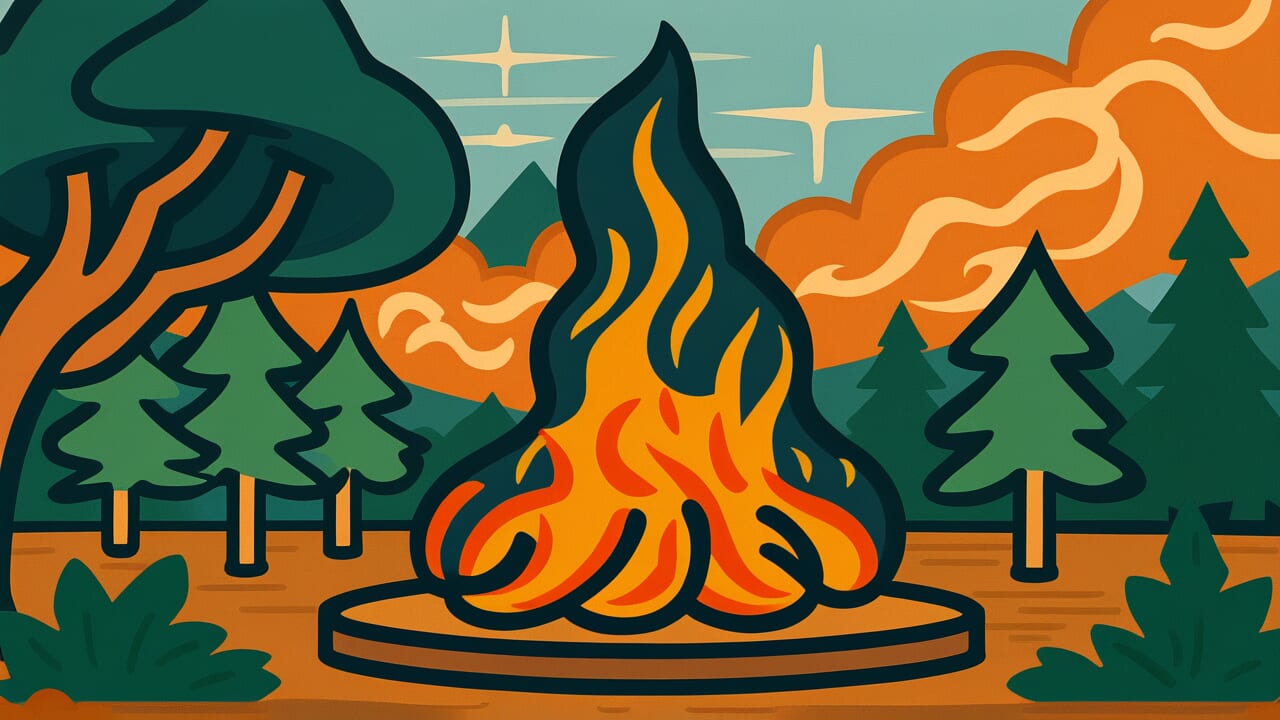How to Read “The fire of Mount Hinoki comes from hinoki wood and burns the hinoki”
Hiyama no hi wa hinoki yori idete hinoki wo yaku
Meaning of “The fire of Mount Hinoki comes from hinoki wood and burns the hinoki”
This proverb describes how organizations or groups collapse from internal problems rather than external attacks. Just as fire on Mount Hinoki starts from the hinoki wood itself and burns all the hinoki trees, the very elements that should support an organization can lead it to destruction instead.
People use this expression when a company’s scandal comes to light through whistleblowing. It also applies when a leader’s misconduct causes the entire organization to lose credibility.
The proverb is especially fitting when someone in a position to protect and nurture the organization does the opposite. In modern times, people quote this saying when discussing corporate governance and the importance of internal controls.
Origin and Etymology
This proverb likely comes from the characteristics of hinoki cypress wood and a place name called Hinoki Mountain. Hinoki is a premium wood in Japan that has been valued as building material since ancient times.
Mountains with abundant hinoki trees are called “hinoki-yama.” However, no clear historical records explain the exact origin of this saying, so several interpretations are possible.
The most likely explanation involves forest fires on hinoki mountains. Hinoki wood contains high oil content and burns intensely once ignited.
When a fire started on a hinoki mountain, it would use the hinoki trees themselves as fuel. The fire would grow stronger and eventually burn down the entire hinoki forest. This ironic phenomenon left a strong impression on people.
The phrase structure is also important. The expression “comes from hinoki” emphasizes that the fire originates from the hinoki itself. This clearly shows the cause is internal, not an external attack.
The paradox of valuable hinoki destroying itself through its own nature became a metaphor. It now represents internal collapse in organizations and groups.
Interesting Facts
Hinoki appears in the Nihon Shoki, an ancient Japanese chronicle. The text states “hinoki should be used for palaces,” showing it was treated as the finest building material since ancient times.
The image of hinoki burning itself carries deep tragedy. It represents the most valuable thing destroying itself.
The high oil content in hinoki has two sides. As building material, it provides durability and pleasant fragrance. But during fires, it becomes highly flammable.
This duality symbolizes how strengths and weaknesses in organizations are two sides of the same coin.
Usage Examples
- I heard that company went bankrupt because their accounting manager’s embezzlement was discovered. It’s truly “The fire of Mount Hinoki comes from hinoki wood and burns the hinoki.”
- The organization collapsed because a trusted executive betrayed them. This is exactly what “The fire of Mount Hinoki comes from hinoki wood and burns the hinoki” means.
Universal Wisdom
The deepest truth in this proverb is that the seeds of destruction always lurk inside. We react sensitively to external enemies and threats.
But we become surprisingly insensitive to corruption and contradictions developing quietly within. Recognizing internal problems means admitting flaws in ourselves or our groups.
The paradox of supporting elements destroying an organization is a universal pattern in human endeavors. Mighty empires fell not from external enemies but from internal corruption and power struggles.
Prosperous companies collapsed not from market changes but from internal fraud and complacency. History has shown this lesson repeatedly.
Thinking deeper, this proverb also speaks about trust and betrayal. For Mount Hinoki, the hinoki trees are the most precious component. That’s why fire from the hinoki itself is fatal.
In organizations, betrayal by the most trusted person has the greatest destructive power. This happens because of the depth of that trust.
Just as pain from loved ones cuts deepest, internal collapse leaves far more serious wounds than external attacks.
This proverb has been passed down because humans cannot escape this danger as long as they form groups. It’s an eternal challenge rooted in human nature.
When AI Hears This
Hinoki trees spend decades or centuries converting solar energy into chemical energy through photosynthesis. They store this in complex molecular structures called cellulose and lignin.
This highly organized state is called a “low entropy state” in thermodynamics. Hinoki is essentially an “energy savings account” built over time with energy locked in ordered structures.
But when fire ignites, this savings account breaks open instantly. Through combustion, the chemical energy stored in hinoki converts to heat and light. Complex molecules break down into simple ones like carbon dioxide and water vapor.
Order built over hundreds of years transforms into disordered ash and heat in hours. This is the law of entropy increase. As a universal law, order always moves toward disorder.
What’s interesting is that hinoki itself becomes fuel. Because it has high order, it simultaneously contains large amounts of energy. “Being an excellent structure” and “being flammable fuel” are two sides of the same coin.
The same principle explains when accumulated knowledge and technology in companies become obstacles during changing times. High order itself increases the potential for collapse.
Lessons for Today
This proverb teaches modern people the importance of maintaining internal health in organizations and relationships. We need courage to look inward, not just at external competitors and difficulties.
For organizations, transparent operations and mutual checking systems are essential. Concentrated power and information monopolies create breeding grounds for internal corruption.
On a personal level, we must face contradictions and weaknesses within ourselves. We should understand that traits we consider strengths can become weaknesses depending on the situation. Constant self-examination is necessary.
Most importantly, don’t ignore problems when you spot warning signs. If you address small sparks early, they won’t become huge fires that burn down the entire mountain.
Pointing out internal problems takes courage. But it’s the best way to protect organizations and relationships. Your honesty becomes the power that protects what matters.



Comments